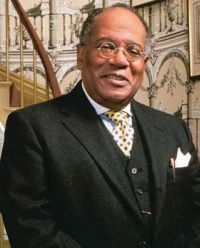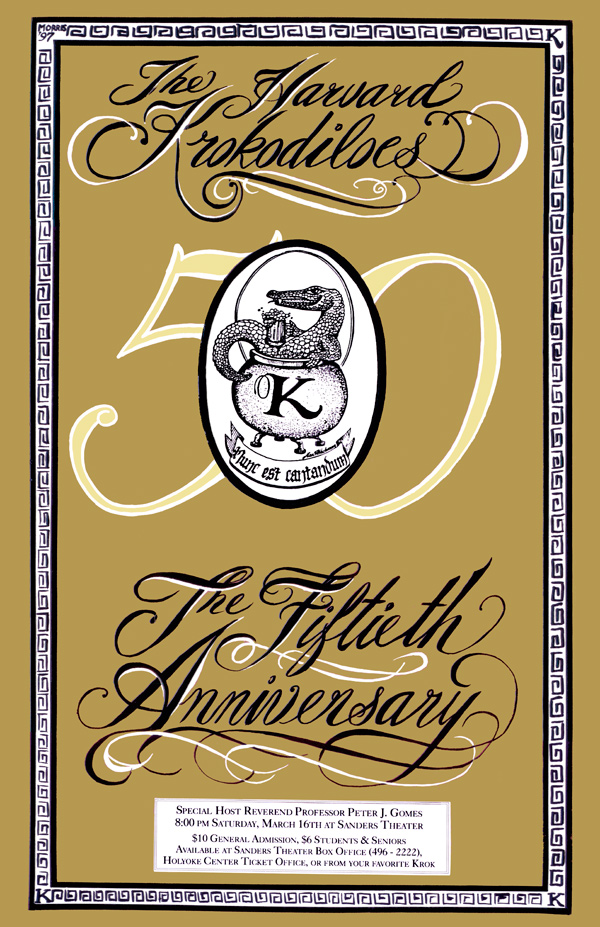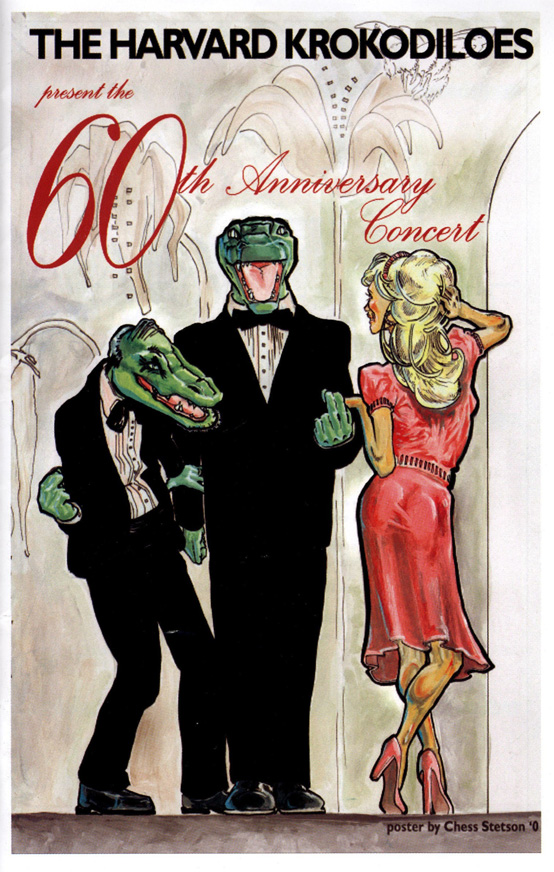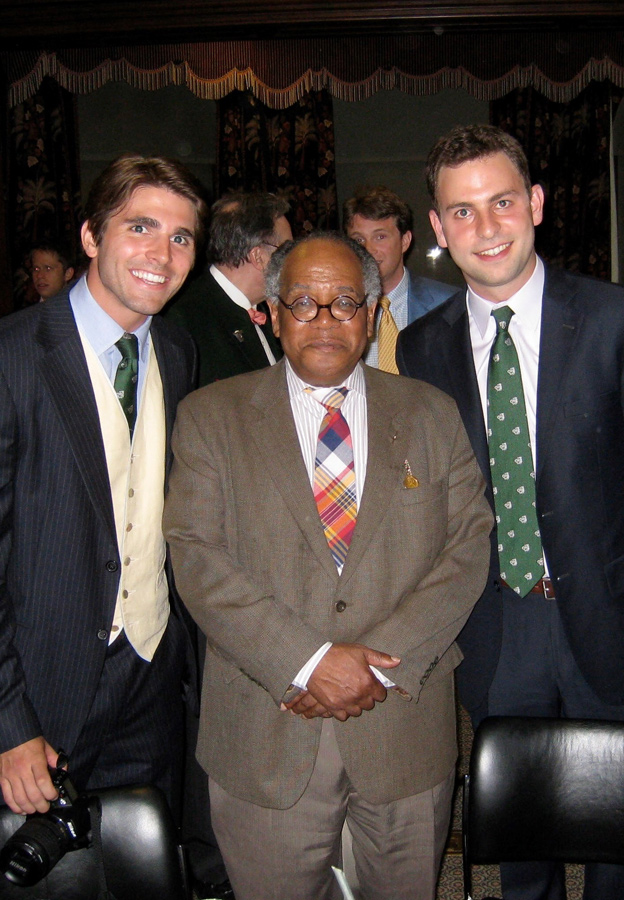Reverend Peter Gomes, HK 2009 (1942-2011)

The Kroks of 1993 were the first to ask Reverend Gomes to emcee a Krok concert at Sanders Theater. Some of the Kroks knew Reverend Gomes through the University Choir.
Adrian Ashkenazy commented that they probably asked him to emcee because
“He was one of the more affectionately loved mentor figures on campus. And he had a wicked sense of humor. For me, that was the reason to have him. He was also such a vivacious character and I always enjoyed my interactions with him.”
Glen Bianchi adds,
“We thought it would be a slightly unorthodox choice and he would be a good draw.”


The occasion was their Valentine’s Jam with the Princeton Tigerlilies. While just figuring out how to be a good Master of Ceremonies for such a major concert was no small matter, this concert proved to be an even bigger challenge. The Tigerlilies, the opening act of the concert, were delayed by some combination of winter weather and traffic. Before their very late arrival, he ended up doing two quite long introductions totaling nearly 18 minutes (the second one completely ad-lib), broken up only by an ad hoc sub-group of the Radcliffe Pitches who stepped up from the audience and, completely on the fly, sang five songs.
The Reverend mounted his next engagement with the Kroks at their 50th Anniversary concert on March 16, 1996. Tony Salewski, General Manager of the Kroks of 1996 reports:
“I remember that there was some debate around the 50th about who would emcee. This was a big deal, a big event, and we wanted to a big personality. We discussed inviting numerous professors and even President Rudenstine, but it was pretty unanimous that Reverend Gomes was the choice. He was a Harvard crowd favorite and had developed a good relationship with the group. His manner of wit, his three-piece suit adorned by a pocket watch, along with his “Harvard accent”, made him a perfect match for the Kroks. I remember asking him if he wanted to speak beforehand about the concert and discuss potential comments — he replied something along the lines of, “My good boy, I think I’m all set…” Whether he prepared at all is a real question, but the result was that he brought the house down and was a Krok through and through.”
For most of our alums, this was their first chance to see Peter’s skill and charm as an orator and preacher shine brightly as emcee for the Kroks. He was incredibly funny, poignant and blunt. This concert cemented him as the very first choice to emcee our concerts at Sanders.



The Kroks of 2001 and 2004 also asked him to sing at their Fall Jams with Yale groups – the Whiffs in 2001 and the Alley Cats in 2004.

His final concert with the Kroks was perhaps his biggest – the 60th Anniversary concert on March 17th of 2006. Clayton Thomas, General Manager of the Kroks of 2006, commented:
“For most Sanders concerts, let alone one as momentous as the 60th, there was always vigorous debate on who should emcee. Who was currently popular on campus and would draw in students? Who would deliver the best opening? Who appreciated the unique history and mission of the Kroks? For this concert, there was no debate–everyone immediately agreed it had to be Reverend Gomes. As the group’s Faculty Advisor, mentor to many generations of Kroks, lover of music, consummate Harvard historian, pillar of the community, and world-class orator, only he could bring to life the energy and feeling we were hoping to achieve that night. If memory serves, he graciously agreed to host not only the concert that weekend, but also a 100-person luncheon at Sparks House organized by Todd Fletcher.”
Alumni and Honorary Kroks from around the world had joined us in Cambridge for this very big reunion. He exceeded even his prior incredible levels of excellence, leaving the crowd feeling that the Kroks must be quite important to Harvard for the Reverend to have delivered such a thoughtful and entertaining perspective on the history of the group. He also knew exactly how to thrill all alumni in attendance and make them feel a vital part of this historic event.

In May of 2009, the Board hosted a Spring Alumni Dinner in one of the private rooms at the Faculty Club, Eliah Seton’s first event as President of the Board. Nearly 60 alumni and guests attended. The featured guest of the dinner was Reverend Gomes – not only because of his outstanding oratorical contribution to the Kroks, but also because of his fondness for the social organizations on campus, including the Signet, where he chaired the board, the Hasty Pudding Club, and various other social clubs. The Kroks of 2009 performed at the end of dinner and then Eliah oversaw a “Gomes appropriate” roast of the Reverend, all done in playful fun.
Eliah toasted him with:
“Good evening again, ladies and gentlemen. As we mentioned briefly earlier, we are very honored to have Reverend Gomes joining us here this evening.
I usually take these opportunities, standing up before you all with a glass of wine in my hand, to talk about myself. Tonight will be no different. When I was a junior in the College, I joined the Kroks, and I even attended class from time to time. In the spring, the class I attended most was Religion 1513: The History of Harvard and Its Presidents. I had the good privilege of sitting in Reverend Gomes’ section, along with James Fisher and every member of every final club on campus.
As a side note, the clubs and traditional Harvard institutions have no better friend than Reverend Gomes, who himself is a former Board Chair of the Signet Society.
Throughout that course, and on a number of other circumstances, I had the privilege of getting to know this man who has hosted so many Krok concerts and supported our group as our faculty advisor for so many years.
Reverend Gomes has hosted so many of our concerts in Sanders Theatre, and most notably, he hosted the 50th Anniversary and 60th Anniversary Concerts. In fact, at the 60th Anniversary weekend, he opened the doors of Sparks House to host the Friends of the Kroks in from all over the world to celebrate that weekend.
But I remember sitting in the audience at the 60th Anniversary Concert and listening to his most wonderful introduction of the group. It struck me then – as it did many of us – how well Reverend Gomes knows the Kroks. As he described us, I realized, perhaps Reverend Gomes was himself a Krok in another lifetime. Perhaps in fact, Reverend Gomes sees a bit of himself in us.
I took notes that evening and want to share some of what he said – perhaps you’ll map the similarities:
“But the one thing we know, in addition to their musical talent (which has never been in short supply), is the splendid ego of the Krokodiloes. It is a beautiful thing to behold. In these egalitarian, flattened-out days, where nobody is any better than anybody else and everybody looks like everybody else. Out of that rather bland crowd, sticks the image and the ego of the Krokodiloes. I applaud that. I salute that. Somebody must stand out from the maddening crowd. Somebody must rise above the horizon of mendacity and mediocrity. Somebody must take the hit for being the best, the first, the oldest and the brightest.”
Ego, sir? Indeed.”
He went on to say:
“The Krokodiloes are one of the most un-subtle musical groups I have ever come to know.”
Un-subtle, sir? Imitation is the finest form of flattery, Reverend.
But as he concluded his introduction, which was more like an introduction and then a recitation of the first half of Ulysses, what he said about the Kroks struck me like a thunderbolt:
“Nothing makes them happier than to make you happy.”
Reverend Gomes, you get us, sir. Ego and un-subtlety aside, perhaps the friendship between the Kroks and Reverend Gomes is rooted in that – a happiness in bringing happiness to others.
Every time we have asked you to host our concerts, it has been an aspirational thing for us. The Kroks travel all over the world, to six continents annually, to dozens and dozens of countries. But every year, we return to Cambridge, where we were founded, to the University that bears our name, and where a new group forms each September and strives to carve out a place for itself in the history of Harvard.
The Kroks are trying to spread the gospel of Harvard, trying to spread our happiness through the world. This may be an aspirational thing for us, Reverend Gomes, but it describes you to a T.
The steeple of Memorial Church sits elegantly over Tercentenary Theatre and watches over the Yard, much like its Reverend watches over his University. Reverend Gomes is a man whose name is synonymous with Harvard, whose reputation precedes him everywhere he goes, who has offered such gracious friendship to our institution for so many years, and who has brought peace and happiness to so many for so long.
On behalf of the Kroks of 2009, the nearly 400 alumni of our group, our 16 Honorary Kroks, including those present this evening, and thousands of friends of the Kroks from all over the world, Reverend, as you continue to watch over your University, from your perch beneath that steeple, we would be honored if you would join us as an Honorary Krokodiloe.”
As is tradition in the Kroks, only the current undergraduate group can make someone an Honorary Krok. Frank DeSimone, General Manager of the Krokodiloes of 2009, had this special honor on this night and said to Reverend Gomes:
“We thank you for your loyalty and friendship to our institution, and it’s our honor to welcome you into the Krok community as an honorary member—this is a distinction only given to 16 people in the Kroks’ 63-year history, including Leonard Bernstein, Princess Grace of Monaco, and King Bhumibol of Thailand. We’d like to sing our two most traditional Krok songs in your honor – Johnny O’Connor and Loch Lomond. In response, Gomes (who was quite surprised and touched) said:
“It has been my fancy and my fantasy to join the Krokodiloes.””

Obituary:
Rev. Peter J. Gomes is Dead at 68; A Leading Voice Against Intolerance
The New York Times
The Rev. Peter J. Gomes, a Harvard minister, theologian and author who announced that he was gay a generation ago and became one of America’s most prominent spiritual voices against intolerance, died on Monday in Boston. He was 68.
The cause was complications of a stroke, Harvard said. His death, which was first reported by The Harvard Crimson, was confirmed by Emily Lemiska, a spokeswoman at Massachusetts General Hospital, where Mr. Gomes had recently been treated. He lived in Cambridge and Plymouth, Mass.
One can read into the Bible almost any interpretation of morality, Mr. Gomes liked to say after coming out, for its passages had been used to defend slavery and the liberation of slaves, to support racism, anti-Semitism and patriotism, to enshrine a dominance of men over women, and to condemn homosexuality as immoral.
He was a thundering black Baptist preacher and for much of his life a conservative Republican celebrity who wrote books about the Pilgrims, published volumes of sermons and presided at weddings and funerals of the rich and famous. He gave the benediction at President Ronald Reagan’s second inauguration and delivered the National Cathedral sermon at the inauguration of Reagan’s successor, George Bush.
At Harvard, Mr. Gomes was the Plummer professor of Christian morals at the School of Divinity and the Pusey minister of Memorial Church, a nondenominational center of Christian life on campus. For decades, he was among the first and the last to address undergraduates, greeting arriving freshmen with a sermon on hallowed traditions and advising graduating seniors about the world beyond the sheltering Harvard Yard.
Then, in 1991, he appeared before an angry crowd of students, faculty members and administrators protesting homophobic articles in a conservative campus magazine whose distribution had led to a spate of harassment and slurs against gay men and lesbians on campus. Mr. Gomes, putting his reputation and career on the line, announced that he was “a Christian who happens as well to be gay.”
When the cheers faded, there were expressions of surprise from the Establishment, and a few calls for his resignation, which were ignored. The announcement changed little in Mr. Gomes’s private life; he had never married and said he was celibate by choice. But it was a turning point for him professionally.
“I now have an unambiguous vocation — a mission — to address the religious causes and roots of homophobia,” he told The Washington Post months later. “I will devote the rest of my life to addressing the ‘religious case’ against gays.”
He was true to his word. His sermons and lectures, always well attended, were packed in Cambridge and around the country as he embarked on a campaign to rebut literal and fundamentalist interpretations of the Bible. He also wrote extensively on intolerance.

In his 1996 best seller, “The Good Book: Reading the Bible with Mind and Heart,” Mr. Gomes urged believers to grasp the spirit, not the letter, of scriptural passages that he said had been misused to defend racism, anti-Semitism and sexism, and to attack homosexuality and abortion. He offered interpretations that he said transcended the narrow context of modern prejudices.
“The Bible alone is the most dangerous thing I can think of,” he told The Los Angeles Times. “You need an ongoing context and a community of interpretation to keep the Bible current and to keep yourself honest. Forget the thought that the Bible is an absolute pronouncement.”
But Mr. Gomes also defended the Bible from critics on the left who called it corrupt because passages had been used to oppress people. “The Bible isn’t a single book, it isn’t a single historical or philosophical or theological treatise,” he told The Seattle Gay News in 1996. “It has 66 books in it. It is a library.”
Peter John Gomes (rhymes with homes) was born in Boston on May 22, 1942, the only child of Peter Lobo and Orissa White Gomes. His father, born in the Cape Verde Islands off Africa’s west coast, was a cranberry bog worker. His mother was a graduate of the New England Conservatory of Music. Peter grew up in Plymouth with literature, piano lessons and expectations that he would become a minister. He was active in the Baptist Church and preached his first sermon at 12.
He worked as a houseman to help pay for his education. After graduation from Plymouth High School in 1961, he attended Bates College in Lewiston, Me., a coeducational liberal arts institution founded by abolitionists in 1855. He majored in history and received a bachelor’s degree in 1965; he then earned a bachelor of divinity degree at Harvard in 1968 and was ordained a Baptist minister.
After two years teaching Western civilization at Tuskegee Institute in Alabama, he returned to Harvard in 1970 as assistant minister of Memorial Church. His first book, “History of the Pilgrim Society, 1820-1970,” was published in 1971. “The Books of the Pilgrims,” written with Lawrence D. Geller, appeared four years later. In 1974 he was named Plummer professor and Pusey minister.
In clerical collar and vestments, Mr. Gomes was a figure of homiletic power in the pulpit, hammering out the cadences in a rich baritone that The New Yorker called a blend of James Earl Jones and John Houseman. In class, he was a New England patrician: the broad shoulders, the high forehead and spectacles that tilted up when he held his head high, the watch chain at the vest and a handkerchief fluffed at the breast pocket.
Mr. Gomes spoke extensively in the United States and Britain. In 1979, Time magazine called him one of the nation’s best preachers. While much of his later life was occupied by scholarly questions of the Bible and homosexuality, he came to abhor the label “gay minister,” and pursued a much wider range of studies, on early American religions, Elizabethan Puritanism, church music and the African-American experience.
He also continued to write. Besides volumes of sermons, his books included “The Good Life: Truths that Last in Times of Need” (2002), “Strength for the Journey: Biblical Wisdom for Daily Living” (2003) and “The Scandalous Gospel of Jesus: What’s So Good About the Good News” (2007).
In 2006, he became a Democrat and supported Deval Patrick, who was elected the first black governor of Massachusetts.

